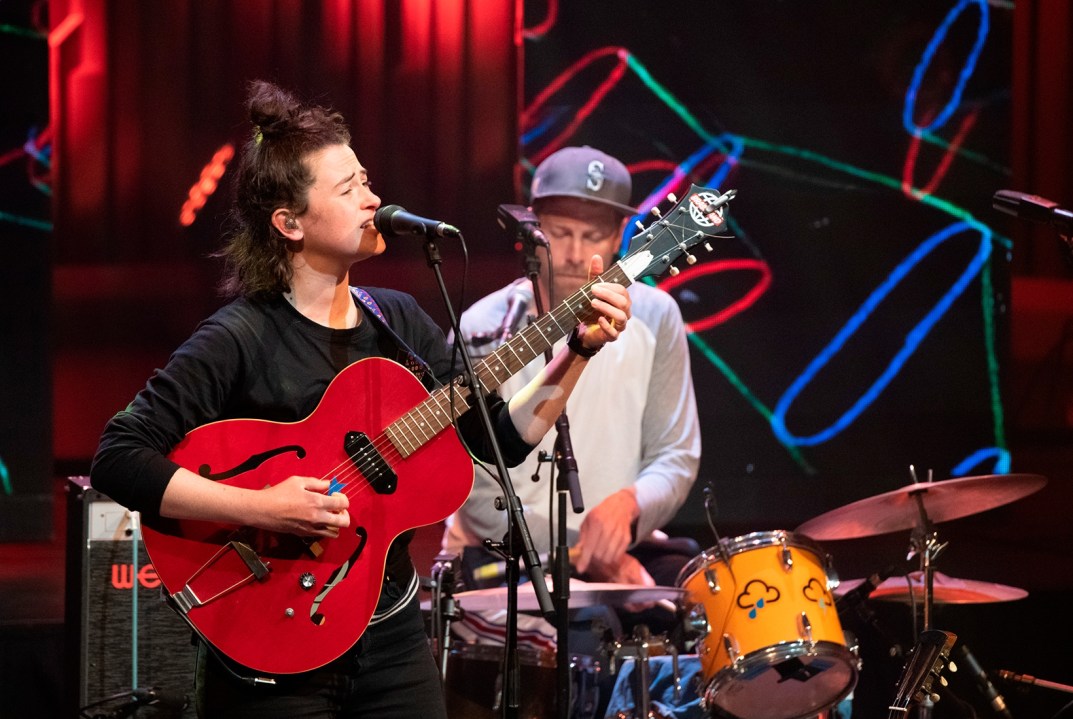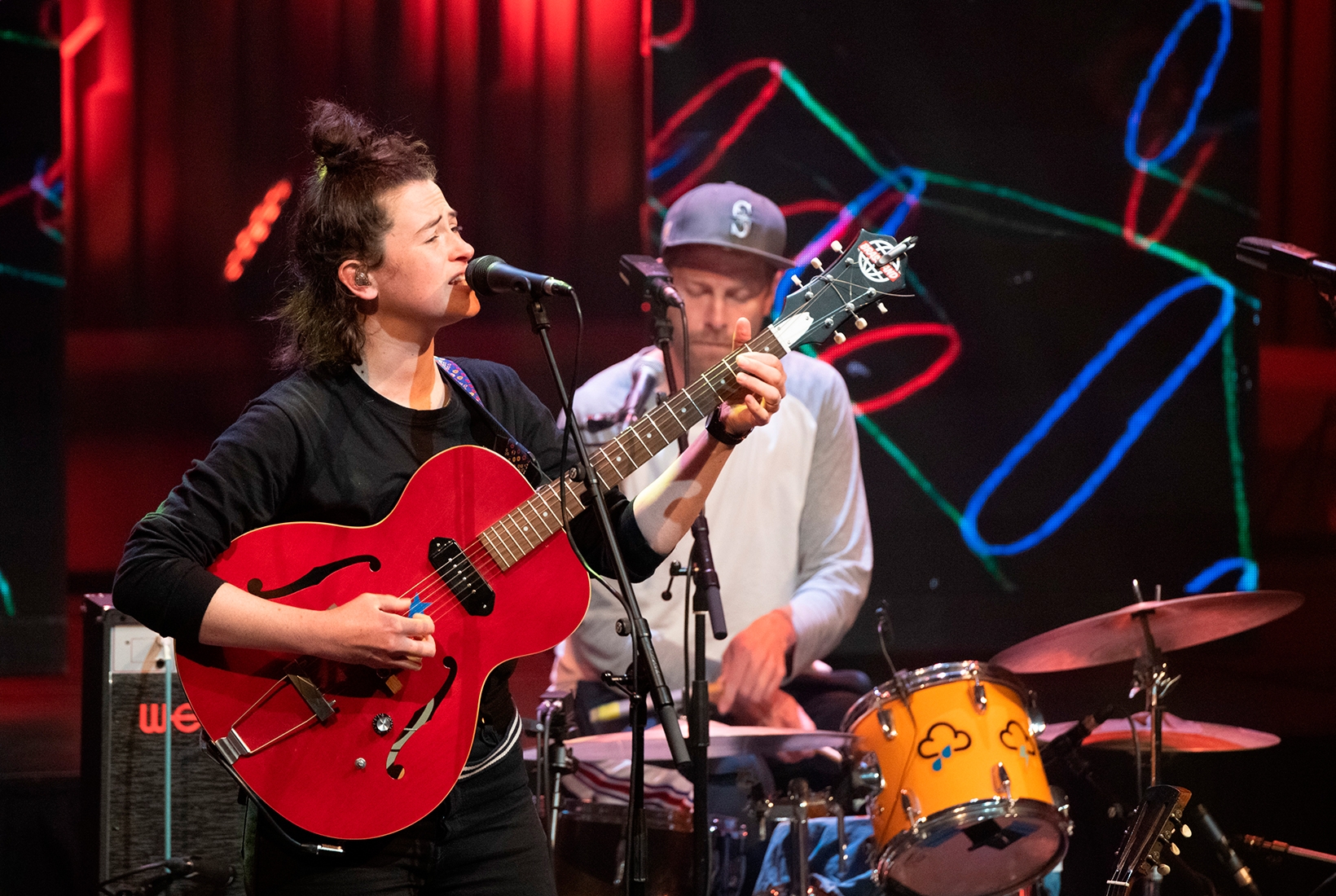On the way home from This Is The Kit’s show at a socially distanced Barbican, I listened to Avalon by Roxy Music, which had been brought to mind by the previous 90 minutes or so of music. It’s perhaps worth saying that This Is The Kit — the nom de chanson of Kate Stables, backed by a three-piece band and three horn players — have absolutely nothing in common with Avalon by Roxy Music, visually or musically.
Stables, hair piled on top of her head, and dressed for comfort, not speed, did not look as though she intended to boost the Colombian export trade after the show; perhaps, instead, she would be offering forthright opinions about agribusiness over a lentil bake. Her lyrics did not concern themselves with the ennui of the partier who has exhausted their appetite for hedonism; they were vague, a bit self-helpy, and on occasion truly eyebrow-raising: ‘Fragile sanity, you’re treating us so roughly,’ she sang on ‘Hotter Colder’, eschewing subtle allusiveness for a wallop round the head. As for the music, well, there were no banjos on Avalon, a record distinctly lacking in folkiness.
Gwenifer Raymond served notice that for every male virtuoso there was a woman you never got to hear
Then why did the earnest folk-pop of This Is The Kit summon thoughts of Roxy? Because of the wispy, gauzy beauty of the music. On Avalon, a lot of the songs are barely there: they are basslines from which instrumental and vocal baubles have been hung to create something greater than the sum of the parts. That’s precisely the feeling I got listening to this band performing these songs. It should be said that these were properly constructed songs — they were not mere wisps — but each element was so perfectly judged that they were like interlocking cogs and wheels, running in unison, all hanging off Stables’s banjo or guitar, which was always the tentpole of the song.
The most distinctive Roxyness came from Neil Smith, playing electric guitar. Just as Phil Manzanera was used more as a colourist on Avalon than a driver of the songs, so Smith altered the palette of Stables’s writing with his contributions, dialled in from another place in space and time. There is, of course, a rich tradition of electric players transforming folk songs, but not usually in the way Smith did on ‘Bashed Out’ and ‘This Is What You Did’, with sheets of fuzz and shards of treble, produced by an array of effects pedals. At times, when the horns and his guitar combined with Stables’s melodies, it felt as though This Is The Kit were quite a new thing, some unworldly combination of the MC5 and Pentangle. I loved it.
This is a bit of a musical golden age for women — so much so that we may finally see the end of ‘Women in Music’ special supplements. That’s probably not because we are in the midst of some golden generation of female talent, more that women who would once have been ignored or not even granted a career are finally getting the chances that always used to go to men. Gwenifer Raymond is an instrumentalist in a field — solo acoustic guitar, in a genre known as ‘American primitive’ for its borrowings from blues and mountain music by people who have traditionally been neither black nor hillbillies — that has been as aggressively male as the heaviest of metal.
Hers is a folk music that is not gentle, and her playing was fiery and brutal. She uses a technique known as clawhammer — a thumbpick hammering down, her fingers clawing at the strings — which meant she sounded as though she were attacking her guitar as much playing it, the tracks rising in speed and intensity, her hands a blur.
On her most recent album, Strange Lights Over Garth Mountain — which she played in full — she took American primitive in European directions, with a eulogy for Erik Satie (which sounded nothing like Satie), nods to flamenco and the intention — perhaps more present in her mind than the listener’s — of summoning her childhood in Wales. It was a little disappointing that she let her playing do all the talking. These first gigs back are about our connection to each other as much as what we are listening to, and it would be nice to have some acknowledgment of that, rather than microphone silence until the encore. But when you can play like Raymond, you probably feel that does enough of the work.
Raymond’s set was strange and beautiful. I remember hearing the father of American primitive, John Fahey, on John Peel’s radio show as a teenager and thinking it was music that sounded as though it were beamed in from a Deep South not of this world; Raymond’s comes from the same place — and she served notice that for every male virtuoso, there was a woman you never got to hear.







Comments